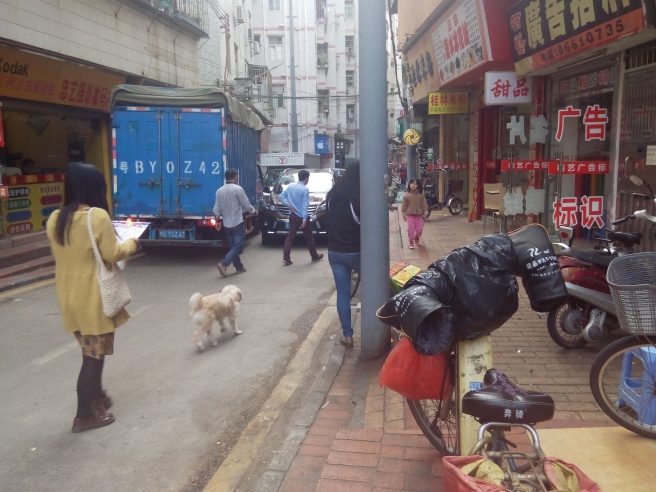
Good Chinese teachers of English aren’t hard to find and are a pleasure to work with.
After a while of teaching English as a second language in China, it’s clear that students tend to make mistakes in more or less the same areas. Of course each learner has his or her unique and individual difficulties but, in addition to this, there are common misunderstandings which crop up frequently.
When I did some research into possible reasons why, there was no one consensus but it did seem to be a possible result of erroneous teaching in school. This made sense to me, as unlike an English education system where students may study different texts using various methodology, Chinese students, with the goal of passing the forbiddingly arduous Gaokao exam in order to get into a good university, are generally taught in a more uniform manner across the country. This is to ensure fairness and continuity.
Consequently, with such standard teaching methods, this is most likely why my students who are from a variety of schools and provinces and of differing ages, tend to make the same mistakes in their spoken English.
So, in an attempt to ease the frustrations in the classroom of a foreign English teacher, here’s a helpful note to my Chinese counterparts. If you could stop teaching your pupils these things, everybody would benefit. Really.

- Erroneous Phrases Such As ‘Of Course No!
This is a common phrase which makes perfect sense in Chinese but does not translate according to the same rules. It probably should and probably would if the English language only used one word for no, but as there are many, this phrase would need to be amended to become ‘of course not!’ Saying ‘of course no,’ sounds cute but it doesn’t make any sense.
2. Saying Urally for Usually.
This one confuses the hell out of me, frankly. It just doesn’t add up. Why would you change the sound and the spelling? And why would you change these facets to a word which doesn’t actually exist? Many of my most confident and higher level students have inserted this word firmly into their lexicon and getting them to make a correct substitution after so many years is not easy. But please, Chinese teachers of English, from one professional educator to another; ‘Urually’ is NOT a word and your students should never say it. Banish it from your teaching materials immediately.
3. Using Google or Baidu translate for everything.
Stop it. Please. Electronic translators often have a mind of their own and are probably more inaccurate than accurate. Recently in a restaurant, the wait staff used a translator which informed my Italian companion that he ‘didn’t have enough gold in his chest’ to cover the bill. What they meant was that he would have to increase his room deposit. I view translating apps as a necessary evil. Generally the ones which are free are pretty rubbish so please discourage students from depending on them.
4. Omitting the ends of words and other mispronounciation.
Manchester becomes Manchest. Technology becomes Technoledge and so on. Why? No-one seems to know, it’s just the way it’s taught, but it’s really, really wrong. Please encouage your students to say the whole word in these cases. If the word has a French root then, yes, it may well be pronounced with the ending implied, but generally speaking, English words have endings, please use them.
At the other end of the stick, knowledge is knowledgee and college is collegee according to Chinese teachers of English. In this case, dear colleagues (colleagues; another word which we’ll get to in a minute), the letter e is silent. Write it, but don’t pronounce it. Same with doubt and debt. The letter b is lazy, it wants to be written, but it doesn’t want to be said. Likewise with the letter p in the word receipt.
Colleague is not and will never be pronounced colleager.
5. Know when to use The as a place title.
It should not be used for every noun, but only for some. I’m sorry, I really have no idea why, which is another point; there aren’t rules for all of the idiosyncracies in the English language. It would be great if it could be so cut and dried, but unfortunately it isn’t.
Getting back on point, ‘The’ is not used when naming cities; ‘The London, The New York,’ etcetera. It’s also not used when naming some countries. It’s incorrect to say ‘The England,’ ‘The America,’ ‘The Australia,’ or ‘The New Zealand.’ However, you can say ‘The Democratic Republic of The Congo,’ or ‘The United Kingdom,’ and ‘The United States of America.’ Like, I said, I’ve no idea why. It just is.
6. Neighbourhood is not similar to Childhood.
Most students of English are aware that childhood refers to people, places and a time of life but they also think that neighbourhood carries the same connotations. Dear Chinese teachers of English; this word frequently crops up in English speaking exams so pupils need to know that neighbourhood only refers to place and that neighbours refers to people. A small, but significant difference.

Eager students! The best type. Give them proper knowledge.
Okay, so I’ve endeavoured to address the major frustrations of English teachers in China when dealing with students who’ve undergone many years of English training from Chinese teachers.
When all is said and done, we’re all striving for the same goal. May I suggest that in a spirit of friendly co-operation, (as it says on all of my work contracts), we move forward together (whilst hoping for a vast change!).






























